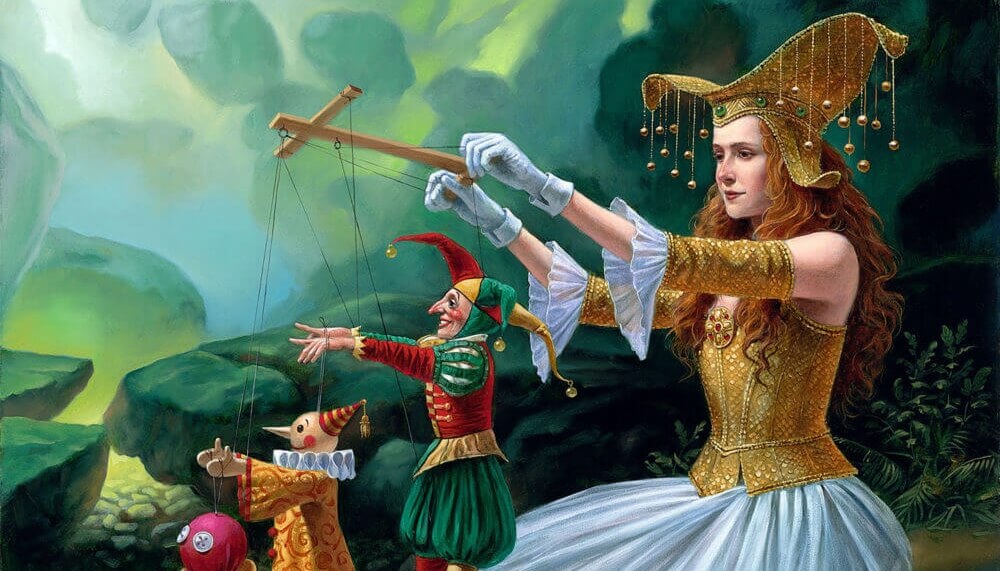The 5 Best Quotes from John Locke

Many quotes from John Locke invite us to reflect and discover great teachings that can be applied to our daily lives. Most of them are part of his works, and will move us greatly.
John Locke was an important British thinker, who was born in 1632 and died in 1704. Although he specialized in medicine, he stood out for his writing and studies in political philosophy.
He was a man with a multidisciplinary vision. Although he is known for the above, it is also worth noting that he was a professor, economist, theologian, diplomat, and writer. However, that’s not all. Locke was one of the key representatives of British empiricism.
In this article, we will focus on some of the best of Locke’s quotes. Phrases full of wisdom that are worth remembering.

Worry as a control mechanism
“What worries you, controls you.”
This is one of John Locke’s first phrases that we consider important. Not only because of the meaning it contains, but because this teaching is still relevant today. What we did not know until recently is that someone tried to transmit this idea many years earlier.
Everything that concerns us controls us, simply because worries turn into a series of thoughts that form a maze with no exit. Beliefs that we feed with fears, doubts, and expectations that, if we do not stop, get bigger and bigger.
When we do not let go of what worries us, anxiety arises. However, there is a Chinese proverb that gives us the solution to prevent concerns from controlling us –
“If you have a problem that has no solution, why do you worry? If you have a solution, why do you worry?”
The important work of parents
“Parents wonder why the streams are bitter when they themselves poison the source.”
This second John Locke quote is addressed to parents, who have an important job to do. However, this phrase is a criticism of an event that happens almost every day. Parents who complain because their children are rebellious, because they have “lost their way”, because they have not adopted the values the parents think are correct…

At present, for example, many parents often complain about their child’s addiction to a cell phone or computer. However, these complaints denote a lack of responsibility on the part of all those parents who use video games, tablets, or any other technology to keep their little ones calm.
It is true that time runs very fast, but you have to know how to prioritize what is important. Sometimes, our responsibilities can make parenting overwhelm us. However, we cannot forget that children will grow and interact with others. They will build relationships, and it is the parents’ responsibility to teach them how to do so.
If you educate them in “take this, play and be quiet” or “I don’t have time right now”, children can easily become addicted to the screen. Where is that quality time that is everything? How can parents serve as an example to their children, if tomorrow they become addicted to their phones? Parents guide this process. Parents can poison the source.
Happiness and the mind
“Men always forget that human happiness is a disposition of the mind, and not a condition of circumstances.”
The third of John Locke’s phrases tells us about that happiness that every human being yearns for, but most seek in the least appropriate places. Perhaps, as he says, we believe that happiness depends on the circumstances.
If we get fired from work, we cannot be happy; when we can’t find a romantic partner, we cannot be happy; if we do not have children, we cannot be happy; if we do not have enough money, we cannot be happy. . . .The big question is – who told us that this is true?
At what point have we forgotten that an error is an opportunity? Not having a job could be a chance to start again. Happiness awaits us around every corner. It is our decision to walk towards it or not.

The beliefs that we harbor in our mind condition us so much that we give a huge importance to everything that happens outside, without prioritizing the interior. With new perspectives, with a different way of seeing things, one can realize that, in reality, there is no reason to be unhappy.
The desire to be like others
“We are like chameleons, we take our tone and the color of our moral character from those around us.”
Undoubtedly, this fourth quote from John Locke contains a great criticism of what was said in the past, but is very relevant today. All people are different. However, there is a tendency to want to be like others, lose authenticity, and thus be approved by others.
That desire for approval, to belong to a group, makes us lose our own identity. Everything that makes us different shames us, because we consider the judgments of others and criticisms as something true.
Instead of feeling proud when someone points out our different thoughts or way of seeing things, when they judge our customs, we are ashamed of all this. As the previous quote said, we believe that happiness depends on circumstances. That it comes from the outside. Therefore, we transform ourselves into chameleons and sacrifice our own essence.
The value of effort
“All wealth is the product of work.”
Who wants to be rich? If we asked this question to a room full of people many hands would go up. However, wealth can have very different sources. This last phrase points out that, above all, wealth is the product of work, effort, and perseverance.
If we do not persist, we will be intimidated at the first error that appears and want to back down. We will lose everything we have achieved so far. If we do not make an effort, what we do will not pay off. It is necessary to work to get what we want. Doing so will make us rich.

We can be rich in money, in health, in knowledge… Rich for doing what we like, because our life is spending wealth… Rich for having friends or a healthy family. We can be rich in many ways, but in each of them there is an effort and a job, a perseverance and a certain attitude.
“Almost everything history talks about is nothing but fighting and killing.”
-John Locke
These 5 quotes from John Locke allow us to realize that, even many years ago, great thinkers were trying to open our eyes to the same subjects we struggle with today. Is it not about time we take another step? At what point will these phrases stop being advice and become a way of life?
Many quotes from John Locke invite us to reflect and discover great teachings that can be applied to our daily lives. Most of them are part of his works, and will move us greatly.
John Locke was an important British thinker, who was born in 1632 and died in 1704. Although he specialized in medicine, he stood out for his writing and studies in political philosophy.
He was a man with a multidisciplinary vision. Although he is known for the above, it is also worth noting that he was a professor, economist, theologian, diplomat, and writer. However, that’s not all. Locke was one of the key representatives of British empiricism.
In this article, we will focus on some of the best of Locke’s quotes. Phrases full of wisdom that are worth remembering.

Worry as a control mechanism
“What worries you, controls you.”
This is one of John Locke’s first phrases that we consider important. Not only because of the meaning it contains, but because this teaching is still relevant today. What we did not know until recently is that someone tried to transmit this idea many years earlier.
Everything that concerns us controls us, simply because worries turn into a series of thoughts that form a maze with no exit. Beliefs that we feed with fears, doubts, and expectations that, if we do not stop, get bigger and bigger.
When we do not let go of what worries us, anxiety arises. However, there is a Chinese proverb that gives us the solution to prevent concerns from controlling us –
“If you have a problem that has no solution, why do you worry? If you have a solution, why do you worry?”
The important work of parents
“Parents wonder why the streams are bitter when they themselves poison the source.”
This second John Locke quote is addressed to parents, who have an important job to do. However, this phrase is a criticism of an event that happens almost every day. Parents who complain because their children are rebellious, because they have “lost their way”, because they have not adopted the values the parents think are correct…

At present, for example, many parents often complain about their child’s addiction to a cell phone or computer. However, these complaints denote a lack of responsibility on the part of all those parents who use video games, tablets, or any other technology to keep their little ones calm.
It is true that time runs very fast, but you have to know how to prioritize what is important. Sometimes, our responsibilities can make parenting overwhelm us. However, we cannot forget that children will grow and interact with others. They will build relationships, and it is the parents’ responsibility to teach them how to do so.
If you educate them in “take this, play and be quiet” or “I don’t have time right now”, children can easily become addicted to the screen. Where is that quality time that is everything? How can parents serve as an example to their children, if tomorrow they become addicted to their phones? Parents guide this process. Parents can poison the source.
Happiness and the mind
“Men always forget that human happiness is a disposition of the mind, and not a condition of circumstances.”
The third of John Locke’s phrases tells us about that happiness that every human being yearns for, but most seek in the least appropriate places. Perhaps, as he says, we believe that happiness depends on the circumstances.
If we get fired from work, we cannot be happy; when we can’t find a romantic partner, we cannot be happy; if we do not have children, we cannot be happy; if we do not have enough money, we cannot be happy. . . .The big question is – who told us that this is true?
At what point have we forgotten that an error is an opportunity? Not having a job could be a chance to start again. Happiness awaits us around every corner. It is our decision to walk towards it or not.

The beliefs that we harbor in our mind condition us so much that we give a huge importance to everything that happens outside, without prioritizing the interior. With new perspectives, with a different way of seeing things, one can realize that, in reality, there is no reason to be unhappy.
The desire to be like others
“We are like chameleons, we take our tone and the color of our moral character from those around us.”
Undoubtedly, this fourth quote from John Locke contains a great criticism of what was said in the past, but is very relevant today. All people are different. However, there is a tendency to want to be like others, lose authenticity, and thus be approved by others.
That desire for approval, to belong to a group, makes us lose our own identity. Everything that makes us different shames us, because we consider the judgments of others and criticisms as something true.
Instead of feeling proud when someone points out our different thoughts or way of seeing things, when they judge our customs, we are ashamed of all this. As the previous quote said, we believe that happiness depends on circumstances. That it comes from the outside. Therefore, we transform ourselves into chameleons and sacrifice our own essence.
The value of effort
“All wealth is the product of work.”
Who wants to be rich? If we asked this question to a room full of people many hands would go up. However, wealth can have very different sources. This last phrase points out that, above all, wealth is the product of work, effort, and perseverance.
If we do not persist, we will be intimidated at the first error that appears and want to back down. We will lose everything we have achieved so far. If we do not make an effort, what we do will not pay off. It is necessary to work to get what we want. Doing so will make us rich.

We can be rich in money, in health, in knowledge… Rich for doing what we like, because our life is spending wealth… Rich for having friends or a healthy family. We can be rich in many ways, but in each of them there is an effort and a job, a perseverance and a certain attitude.
“Almost everything history talks about is nothing but fighting and killing.”
-John Locke
These 5 quotes from John Locke allow us to realize that, even many years ago, great thinkers were trying to open our eyes to the same subjects we struggle with today. Is it not about time we take another step? At what point will these phrases stop being advice and become a way of life?
This text is provided for informational purposes only and does not replace consultation with a professional. If in doubt, consult your specialist.







